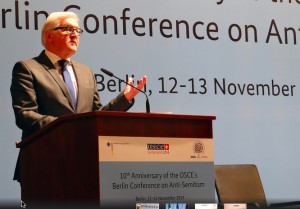NEWS How to Step up Europe’s Efforts Against Renewed Anti-Semitism
A strong encouragement to the OSCE’s States in order to step up their efforts and cooperation in countering anti-Semitic acts and hate crimes, was launched by the high-level conference that recently took place in Berlin to commemorate the OSCE’s Berlin Declaration.
For two days, political leaders, governmental officials and civil society representatives from across the OSCE region gathered in Berlin to commemorate the 10th anniversary of the OSCE’s Berlin Declaration on Anti-Semitism and to discuss the challenges posed by contemporary anti-Semitism. High-level panelists and speakers included Ambassador Samantha Power, United States Ambassador to the United Nations, Miroslav Lajčák, Slovak Republic Deputy Prime Minister and Minister of Foreign and European Affairs, Lynne Yelich, Minister of State of Canada, Paavo Lipponen, Former Prime Minister of Finland, and Tzachi Hanegbi, Deputy Minister of Foreign Affairs of the State of Israel.
Some 550 participants attended the event. Among them, there were also the Vice-president of the Union of the Italian Jewish Communities Roberto Jarach, the delegated of the Union of the Young Jewish Italians Talia Bidussa, the representative of the World Jewish Congress and of the Europe’s Bene Berith Daniel Citone, the representative in Rome of the American Jewish Committee Lisa Palmieri Billig, and Stefano Gatti of the Observatory on Contemporary Anti-Semitism of the Foundation Jewish Contemporary Documentation Center, who presented an interesting report about anti-Semitism in Italy.
“Ten years ago the OSCE States, meeting at the Federal Foreign Office in Berlin, made a strong commitment to oppose anti-Semitism. The events witnessed in many European countries this summer have shown that the fight against anti-Semitism is, regrettably, still necessary and urgent,” said Frank-Walter Steinmeier, Federal Foreign Minister of Germany, who hosted the event. “That is one reason why I found it important to invite the international community to Berlin once again to discuss how we can combat anti-Semitism even more effectively, particularly in the minds of young people.”
“The unprecedented number of civil society participants here in Berlin testifies to the seriousness of the problem today. Despite the commitments made ten years ago and the important work undertaken by ODIHR and some participating States since then, much more must be done,” said Rabbi Andrew Baker, Personal Representative of the OSCE Chairperson-in-Office on Combating Anti-Semitism. “The challenges of providing physical security, the inability to recognize the various sources of anti-Semitism, and the absence of long-term strategies to guarantee a safe and inclusive environment leave many European Jews to wonder about their future.”
The key to effectively combat anti-Semitism is the political leadership, highlighted Didier Burkhalter, OSCE Chairperson-in-Office and Foreign Minister of Switzerland. “It is the responsibility of political leaders to ensure that commitments are fulfilled. Civil society and youth organizations are an essential force to raise awareness about the dangers of anti-Semitism and ways of standing against it. We call on them to continue to engage with the OSCE and make the fight against anti-Semitism a collective endeavor”.
“There is a need to raise awareness among governmental officials about how anti-Semitism manifests itself and how it can be addressed in line with human rights and fundamental freedoms,” confirmed Michael Georg Link, Director of ODIHR-Office for Democratic Institutions and Human Rights of OSCED. “Governments need to understand the historical and contemporary specificities of anti-Semitism in order to effectively tackle the problem. We need to fight anti-Semitism wherever it arises and for whatever reason it is being used”.
“Based on the statements made here today, it is clear that combating anti-Semitism requires a broad approach. The OSCE framework is particularly suited to developing international mechanisms to this end,” said Ivica Dačić, First Deputy Prime Minister and Foreign Minister of Serbia.
“The Berlin conference is an excellent starting platform”, commented Daniele Citone. “However, we have to verify its usefulness and efficacy across time. This is not the place where the necessary actions can be implemented, but it is the right forum in which to discuss, decide and study the ways to carry them on”. “I think that the analysis and the indications given to the 57 OSCE’s States were really good, but we have to see if and how the governments will transform them into concrete actions”.

